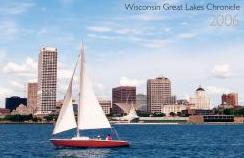
Concerned about our Great Lakes and Wisconsin’s coastal areas? You aren’t alone! These majestic and valuable areas are of great importance to all 8 states that border the lakes (the world’s single largest supply of fresh water, accounting for about 20% of the total) and to all people who use and enjoy them. Where can you educate yourself about the issues facing these resources? Here are some suggestions:
- The Wisconsin Coastal Management Program issues an annual report called Wisconsin Great Lakes Chronicle. It is a beautiful publication that contains some stunning photos, and also provides a briefing of issues and initiatives related to Wisconsin coastal resources. The reports since 2002 are available in the Library’s 2nd-floor Wisconsin Documents collection (COA 1/2:G 766/), or online from the Division of Intergovernmental Relations within the state Dept. of Administration. Use the links on the left side of the web page (under the heading “Coastal Management”) for more information.
- Governor Doyle is chair of the Council of Great Lakes Governors, a not-for-profit organization that provides a newsletter and information on its web site related to invasive species, restoration efforts, progress toward legal protections, and more.
- The International Joint Commission also provides information online. This binational (Canada and United States) organization was established by the Boundary Waters Treaty of 1909 and exists to “help prevent and resolve disputes relating to the use and quality of boundary waters.” Among its publications online are its annual report, a biennial report on Great Lakes water quality (last done December 2006), and special reports such as Emerging Issues of the Great Lakes in the 21st Century Report and Then and Now: Aquatic Alien Invasive Species and the Great Lakes-St. Lawrence Ecosystem.
- The Great Lakes Commission is a binational organization with members from the 8 “Lake” states and associates from two Canadian provinces. Among the information it provides online: an annual water use report, reports on beach health and dredging, an overview of aquatic nuisance species, legislative priorities, resources for teaching about the Great Lakes (click “T.E.A.C.H. Great Lakes” under Communications and Education), and information on the 6,500-mile Great Lakes Circle Tour.
- The Great Lakes Information Network is a partnership of agencies and organizations serving the Great Lakes region. The web site provides data, links to other sites, and news gathered from all over relevant to the Lakes.
Of course, there are also books and articles that are available, including a 2002 book Restoration of the Great Lakes : promises, practices, performances (3rd-floor Main Collection TD223.3 .S67 2002). Ask a reference librarian if you would like assistance locating more books (using the catalog) or finding articles in library databases.

The University Library is a federal depository with many federal, state, local, and international documents on a variety of current and relevant issues available to you in print, microfiche, CD-ROM, and electronically. Come check out your government at the University Library!
